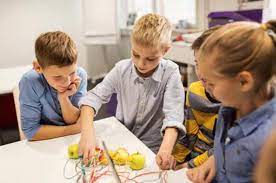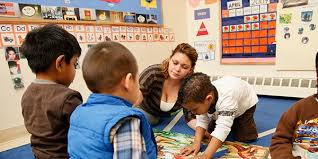A crucial time for growth and education is the initial stages of life, which last from giving birth until age eight. The brains of children grow rapidly at this age, Early learning and development and their experiences have an impact on how they develop socially, emotionally, cognitively, and physically. As a result, childhood education has emerged as a crucial area of study, policy, and practice.
In this article, we all focus on theoretical frameworks, parameters that influence development, assessment and evaluation, and successful practice, Early learning and development this systematic review tries to outline the important studies on the early years of their education and growth.

Table of Contents
- Introduction
- The Value of Early Childhood Learning and Growth
- Theoretical Frameworks for Early Childhood Learning and Development
- Factors Influencing Early Years Learning and Development
- Observation and Rating of Early Childhood Learning
- Effective Practices for Early Childhood Learning and Development
- Conclusion
- FAQs
The Value of Early Childhood Learning and Growth
According to a study, a child’s academic, social, and affective outcomes can be influenced long after they get their preschool education. For instance, children who participate in excellent early childhood education programmes are prone to thrive academically, graduate from high school, and make more money as adults.
On the other hand, youngsters who grow up amid adversity—such as poverty, neglect, or abuse—may have physical, mental, and emotional problems that last into adulthood. Therefore, fostering fairness and social justice may be greatly aided by early childhood education.
Theoretical Frameworks for Early Childhood Learning and Development
Understanding the theoretical frameworks that underpin early childhood learning and development can help educators and caregivers create more effective learning environments. Three prominent theories are discussed below.
-
Piaget’s Cognitive Development Theory
Jean Piaget’s cognitive development theory emphasises that children construct their knowledge through interaction with the environment. According to Piaget, children go through four stages of cognitive development, from birth to adolescence, and each stage is characterised by qualitatively different ways of thinking.
For example, in the sensorimotor stage, infants learn about the world through their senses and motor actions. In contrast, in the formal operational stage, adolescents can think abstractly and use deductive reasoning. Piaget’s theory highlights the importance of active exploration and hands-on learning in early childhood education.
-
Society and Culture According to Vygotsky
According to Lev Vygotsky’s sociocultural theory, social interaction and cultural environment play a significant part in influencing cognitive development. Children learn via social interactions with knowledgeable people, such as parents, classmates, and instructors, according to Vygotsky’s theory.

Additionally, he contended that culture had a significant impact on how cognitive functions like memory, attention, and language are developed. The significance of social and cultural circumstances in early childhood education is highlighted by Vygotsky’s theory.
-
Bronfenbrenner’s Ecological Systems Theory
Urie Bronfenbrenner’s ecological systems theory emphasises the importance of the context in which development occurs. According to Bronfenbrenner, children’s development is influenced by the interactions between the child, the immediate environment (e.g., family, school), and the broader cultural and historical context. He proposed that development is best understood as a dynamic system of interrelated influences. Bronfenbrenner’s theory highlights the importance of considering multiple levels of influence in early childhood education.
Factors Influencing Early Years Learning and Development
Numerous factors can influence early childhood learning and development. The following section summarises some of the most important factors.
-
biological and genetic factors
Early childhood development is shaped by biology and genetics. For instance, studies have revealed that some genes are linked to mental prowess, temperament, and social-emotional growth. Early childhood development can also be impacted by biological variables like diet and toxin exposure.
-
Parenting and providing care
Early childhood development can be strongly impacted by the calibre of parenting and caregiving. Better social, emotional, and cognitive outcomes have been related to healthy parent-child interactions and responsive caring. On the other hand, poor caring practices including neglect, abuse, and inconsistency can harm a child’s growth.

-
Preschool instruction
The growth and maturation of children may also be influenced by the level of early childhood development. Children may learn, socialise, and regulate feelings with high-quality preschool programmes. Low-quality programmes, however, can have the reverse impact and provide subpar results.
-
Financial Situation
Another important component that affects childhood development is economic status. Children from low-income households are more likely to encounter stresses associated with poverty, such as food insecurity and insecure housing, which can have a detrimental effect on their development. Furthermore, they could have limited access to excellent early childhood education programmes and other helpful services.
Observation and Rating of Early Childhood Learning
It is crucial to critically evaluate and evaluate the early years of education and growth to determine areas of advantages and disadvantages and choose the most appropriate solutions. Child development frequently employs several evaluation and evaluation techniques, including standardised exams, teachers’ and parents’ alike news accounts, and monitoring. It’s crucial to remember that examinations need to be both developmentally and culturally appropriate.
Effective Practices for Early Childhood Learning and Development

Research has identified several effective practices for promoting early childhood learning and development, including:
- High-quality early childhood education programs that emphasise active, hands-on learning and social-emotional development
- Positive parent-child relationships and responsive caregiving
- Family involvement in early childhood education
- Use of developmentally appropriate assessment and evaluation methods
- Access to high-quality health care, nutrition, and other supportive services
- Supportive policies and programs that promote equity and address the needs of children and families
Conclusion
In conclusion, a child’s success or welfare in the future will depend on their ability to learn and develop in the early years. Teachers, politicians, and carers may improve the setting in which preschoolers are raised in by having a greater knowledge of the frameworks of theory that promote childhood development, the elements that impact it, and successful practices.
We can work to promote equality and make sure that all children have the chance to realise their full potential by putting a priority on excellent early childhood programmes and tackling economic and social variables which possess a bearing on children’s development.
FAQs
Q1: What age range is deemed “early childhood”?
A: Anything that occurs from birth to eight years old is often referred to as early childhood.
Q2: What are some of the things that affect how young children develop?
A: Several variables may impact the early years of a kid, including genetics, family and care for kids’ practises preschool experiences and economic status.
Q3:How are early learning and development evaluated?
A: Several methods are used to evaluate early childhood learning and development, including observation, parent and teacher reports, and evaluations based on standards.
Q4: What are some proven methods to support early childhood learning and development?
A: The best strategies for encouraging early childhood learning and development includes high-quality preschool education programmes, healthy parent-child connections, family engagement, and availability of supportive resources.
Q5: What part does culture play in the early development of children?
A: Cultures are a key factor in early childhood education because it influences cognitive functions including retention, focus, and language.
Q6:What are the benefits of early childhood education?
A: Preschool education is crucial because it may have a lasting impact on kids’ classroom, social, and affective results. It can additionally encourage fairness by giving kids a solid foundation for success in the future.








